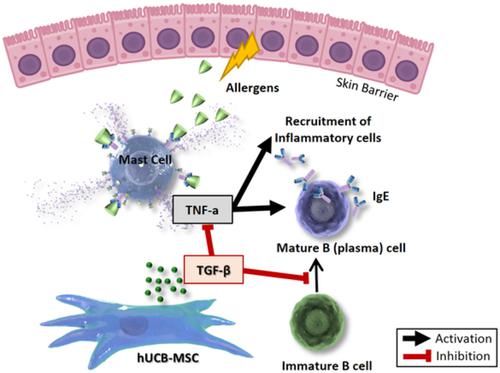当前位置:
X-MOL 学术
›
STEM CELLS
›
论文详情
Our official English website, www.x-mol.net, welcomes your
feedback! (Note: you will need to create a separate account there.)
TGF-β secreted by human umbilical cord blood-derived mesenchymal stem cells ameliorates atopic dermatitis by inhibiting secretion of TNF-α and IgE
STEM CELLS ( IF 4.0 ) Pub Date : 2020-04-14 , DOI: 10.1002/stem.3183 Hwan Hee Park 1 , Seunghee Lee 1 , Yeonsil Yu 1 , Sae Mi Yoo 1 , Song Yi Baek 1 , Namhee Jung 1 , Kwang-Won Seo 1 , Kyung-Sun Kang 1, 2, 3
STEM CELLS ( IF 4.0 ) Pub Date : 2020-04-14 , DOI: 10.1002/stem.3183 Hwan Hee Park 1 , Seunghee Lee 1 , Yeonsil Yu 1 , Sae Mi Yoo 1 , Song Yi Baek 1 , Namhee Jung 1 , Kwang-Won Seo 1 , Kyung-Sun Kang 1, 2, 3
Affiliation

|
Human mesenchymal stem cells (MSCs) are promising therapeutics for autoimmune diseases due to their immunomodulatory effects. In particular, human umbilical cord blood‐derived MSCs (hUCB‐MSCs) have a prominent therapeutic effect on atopic dermatitis (AD). However, the underlying mechanism is unclear. This study investigated the role of transforming growth factor‐beta (TGF‐β) in the therapeutic effect of hUCB‐MSCs on AD. Small interfering RNA (siRNA)‐mediated depletion of TGF‐β disrupted the therapeutic effect of hUCB‐MSCs in a mouse model of AD by attenuating the beneficial changes in histopathology, mast cell infiltration, tumor necrosis factor‐alpha (TNF‐α) expression, and the serum IgE level. To confirm that hUCB‐MSCs regulate secretion of TNF‐α, we investigated whether they inhibit TNF‐α secretion by activated LAD2 cells. Coculture with hUCB‐MSCs significantly inhibited secretion of TNF‐α by LAD2 cells. However, this effect was abolished by siRNA‐mediated depletion of TGF‐β in hUCB‐MSCs. TNF‐α expression in activated LAD2 cells was regulated by the extracellular signal‐related kinase signaling pathway and was suppressed by TGF‐β secreted from hUCB‐MSCs. In addition, TGF‐β secreted by hUCB‐MSCs inhibited maturation of B cells. Taken together, our findings suggest that TGF‐β plays a key role in the therapeutic effect of hUCB‐MSCs on AD by regulating TNF‐α in mast cells and maturation of B cells.
中文翻译:

人脐带血间充质干细胞分泌的TGF-β通过抑制TNF-α和IgE的分泌改善特应性皮炎
人类间充质干细胞(MSC)由于其免疫调节作用而成为治疗自身免疫性疾病的有前途的疗法。尤其是人脐带血来源的间充质干细胞(hUCB-MSCs)对特应性皮炎(AD)具有显着的治疗效果。然而,其根本机制尚不清楚。本研究探讨了转化生长因子-β (TGF-β) 在 hUCB-MSC 治疗 AD 中的作用。小干扰 RNA (siRNA) 介导的 TGF-β 耗竭通过减弱组织病理学、肥大细胞浸润、肿瘤坏死因子-α (TNF-α) 表达的有益变化,破坏了 AD 小鼠模型中 hUCB-MSC 的治疗效果和血清 IgE 水平。为了证实 hUCB-MSCs 调节 TNF-α 的分泌,我们研究了它们是否抑制激活的 LAD2 细胞的 TNF-α 分泌。与 hUCB-MSC 共培养显着抑制 LAD2 细胞分泌 TNF-α。然而,这种效应被 siRNA 介导的 hUCB-MSC 中 TGF-β 的消耗所消除。活化的 LAD2 细胞中 TNF-α 的表达受到细胞外信号相关激酶信号通路的调节,并受到 hUCB-MSC 分泌的 TGF-β 的抑制。此外,hUCB-MSCs分泌的TGF-β抑制B细胞的成熟。综上所述,我们的研究结果表明,TGF-β 通过调节肥大细胞中的 TNF-α 和 B 细胞的成熟,在 hUCB-MSCs 对 AD 的治疗作用中发挥着关键作用。
更新日期:2020-04-14
中文翻译:

人脐带血间充质干细胞分泌的TGF-β通过抑制TNF-α和IgE的分泌改善特应性皮炎
人类间充质干细胞(MSC)由于其免疫调节作用而成为治疗自身免疫性疾病的有前途的疗法。尤其是人脐带血来源的间充质干细胞(hUCB-MSCs)对特应性皮炎(AD)具有显着的治疗效果。然而,其根本机制尚不清楚。本研究探讨了转化生长因子-β (TGF-β) 在 hUCB-MSC 治疗 AD 中的作用。小干扰 RNA (siRNA) 介导的 TGF-β 耗竭通过减弱组织病理学、肥大细胞浸润、肿瘤坏死因子-α (TNF-α) 表达的有益变化,破坏了 AD 小鼠模型中 hUCB-MSC 的治疗效果和血清 IgE 水平。为了证实 hUCB-MSCs 调节 TNF-α 的分泌,我们研究了它们是否抑制激活的 LAD2 细胞的 TNF-α 分泌。与 hUCB-MSC 共培养显着抑制 LAD2 细胞分泌 TNF-α。然而,这种效应被 siRNA 介导的 hUCB-MSC 中 TGF-β 的消耗所消除。活化的 LAD2 细胞中 TNF-α 的表达受到细胞外信号相关激酶信号通路的调节,并受到 hUCB-MSC 分泌的 TGF-β 的抑制。此外,hUCB-MSCs分泌的TGF-β抑制B细胞的成熟。综上所述,我们的研究结果表明,TGF-β 通过调节肥大细胞中的 TNF-α 和 B 细胞的成熟,在 hUCB-MSCs 对 AD 的治疗作用中发挥着关键作用。











































 京公网安备 11010802027423号
京公网安备 11010802027423号